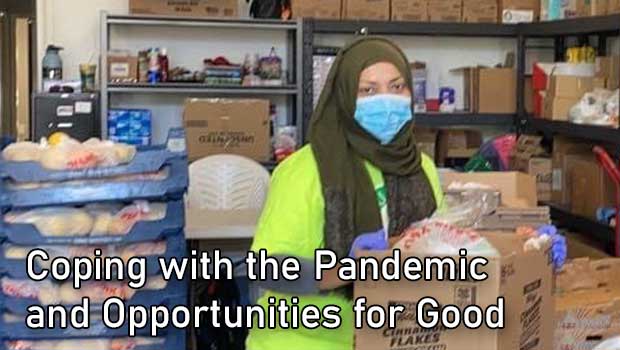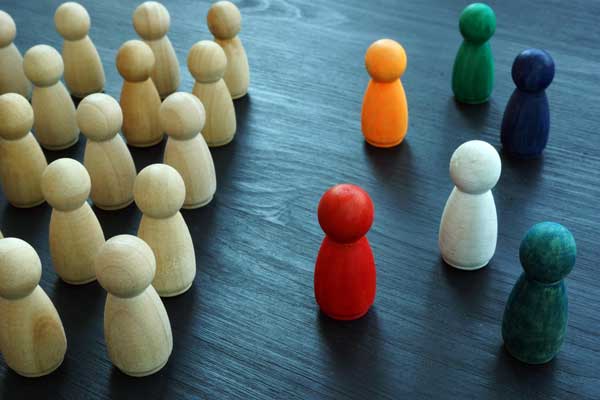It has been around seven months since the World Health Organization declared the novel coronavirus disease, COVID-19, a worldwide pandemic. Sickness and the rising mortalities have devastated communities all over the world, and while we mourn the loss of every soul, a believer should always step back and try to see the power of God amidst the weakness of Bani Adam, and the wisdom of the Creator amidst the chaos of world circumstances.
In a world of ever-increasing conflict and a secular disposition, it behooves our leaders to recognize that, in fact, ultimately, they are in control of nothing, and God truly has power over all things. While it is not correct to dogmatically say that the virus is a punishment from God, as no one knows God’s plan and wisdom, God says in the Qur’an that “…no one knows the soldiers of God except Him…” (74:31). If this is mankind being subdued through the smallest of creation, what then if God wanted to rein Bani Adam in with natural forces of nature, as He did with the people of ‘Aad, Thamud, and Lut? We ask Allah for the ability to see things the way they really are, and seek safety and refuge in Him, from our own shortsightedness and wrongdoing.
Trusting vs Testing God
Much of the grief and psycho-spiritual toll taken on the Ummah the last few months has been in seeing their community events cancelled, their mosques closed down, and even the most sacred mosque of all, the Kaaba, with its most sacred ritual, the hajj, closed to all but the locals of the region. One might feel a pious, visceral protest and impulse of objection to this. Who are they to close these sacred avenues? Should we not trust that God will protect us? We should, but there is a difference between tawakkul and tawaakul. Tawakkul is a dual act, trusting in God in one’s heart, while taking the appropriate means to achieve an end with one’s actions and/or resources. When asked if people should just trust in God and leave their camels to roam without being tied, the Prophet (S) said “Tie them, while putting your trust in God” (Tirmidhi). But tawaakul (note the slight phonetic difference) is essentially testing, not trusting God. It is also a dual act, but in the sense of neglecting the means that God provided you with, while expecting he will provide you with an outcome you want. This is a false sense of piety and a superficial demonstration of trust in God. God is not subject to anyone’s expectations, and throughout the Qur’an, He shows that trust and action must be put together.
When Musa (AS) was cornered by Pharaoh’s army at the Red Sea, he trusted in God, saying “Truly my Lord is with me, and He will guide me” (Qur’an 26:62).Then God commanded him to take an action through which help and protection would come to him: “Then We revealed to Musa, ‘strike the sea with your staff…’”(Qur’an 26:63). If we look at our contemporary circumstances, with CDC recommendations like masks, physical distancing, temporary closures of events and gatherings including religious ones,we can see that these are all the means God has given us to protect ourselves from this virus. Doing so is a sign of understanding Islam and trusting in the Creator, rather than a lack of faith. To understand the significance of taking precautions in order to save lives, God tells us in the Qur’an, “…and if anyone saved a life, it would be as if he saved the life of the whole people…” (Qur’an 5:32).
Once Umar (R), while the second caliph of Islam, led an expedition from Medina toward Syria and enroute, at a place called Sargh, he was informed of a plague that had broken out in Syria. After consulting with his companions, he decided to turn back, but was met with resistance from Abu Ubayda, a companion of the Prophet (S), who asked him, “Is this an attempt to flee from the decree of God?” Umar (R) responded, “We are fleeing from the decree of God to the decree of God.” Thus, Umar (R) is seen here taking precaution in staying away from the plague but also understanding that God’s decree is inescapable no matter what. This is the true application of tawakkul, and the kind of practical and theological balance the believer should apply to this pandemic as well.
The Prophet (S) gave us advice on physical distancing to avoid transmission of sickness when he instructed that healthy animals should not be watered with sick animals (Musnad ibn Hanbal), and the one in a place of plague should not leave it, nor should anyone enter it (Bukhari). Thus, taking precautions and the means to preserve our health is from the sunnah of our very own Prophet (S).
Anxiety and Uncertainty
Along with the pandemic have come many questions and concerns that have understandably caused much anxiety and stress in people’s lives. But perhaps a good way to help us cope is taking the above statement of Umar (R) as a kind of psychological mindset, or perhaps a spiritual “heart-set”… that we are fleeing from God’s decree to God’s decree. We don’t know what the future holds for us, but we do know that God says in the Qur’an,“Say, nothing will ever afflict us, except what God has already decreed for us” (Qur’an 9:51).If we took every precaution in the world to protect ourselves from any sickness, and God had decreed it for us, we would get it. And if everyone in the world was sick with a virus, and God decreed us not to get it, it would not happen. The pens have been lifted, and the pages of destiny have dried, as the Prophet (S) teaches us (Tirmidhi). Not having a firm belief and understanding of this in one’s heart leads to constant imagining of “what if” scenarios that are the seeds of anxiety and distress. In fact, the Prophet (S) told us that just saying “what if” opens a door for Shaytan into your heart (Muslim).
Endless death count trackers on TV and over-politicized news coverage both from the right and the left, however, exacerbates our anxiety. Perhaps we also need a quarantine from news and informational outlets that use fear and speculation to glue viewers to their 24/7 coverage. Social media can have the same effect. It’s important to remember that what we look at and listen to is a form of consumption that can have an effect on our souls the same way food consumption has an effect on our bodies.
It’s also important to be optimistic. The Prophet (S) said that “God has never sent down a disease, except that He also sent down it’s cure” (Musnad ibn Hanbal). Ibn Qayyim notes that this hadith can be applied to both the spiritual and physical worlds. Many potential vaccines are already in the final stages of testing, and we are learning more about the virus as every day goes by. Regardless, when a vaccine does arrive, we still maintain our faith that while the virus causes harm and the vaccine might prevent the illness and curb the spread of the virus , all is in the decree and power of God.
We also should remember that the Prophet (S) said that no Muslim is afflicted with any harm, even if it were the prick of a thorn, but that God expiates his sins because of that, as a tree sheds its leaves. And God willing, believers who die as a result of the virus will be counted among the martyrs. Thus, even in adversity, a believer finds spiritual comfort to manage his/her anxiety.
Opportunities for Good
The stress has not been only spiritual and mental. The sharia sees the preservation of wealth— generating, guarding, and distributing of it — as higher objectives in the religion. And during this pandemic, many have experienced a financial disaster. Thus, this is a golden opportunity to do good. There are many people who have lost their jobs, and families who are in need of financial assistance. These are people we should seek out, so they don’t seek us out, being forced to ask. The best charity is that which is done in the greatest time of need, and in a most discrete and humble of ways.
This is also an opportunity for one’s spiritual growth. While monasticism is not everre commended in Islam, there is a very strong tradition of khalwa (seclusion) and ‘itikaaf (retreat) for spiritual development. This is the perfect opportunity to read more Qur’an and to gain more knowledge of the Seerah of the Prophet (S). One should keep in mind that it was during the retreat and seclusion periods of meditation that the Angel Jibreel (AS) came to the Prophet (S) with the first revelation. It was in these early periods of rapid spiritual growth that the Prophet (S) was ordered to engage in tabattul (73:8), or the cutting oneself off from everything that is a distraction from God. Ibn Qayyim mentions this tabattul in his Madaarij as-Saalikeen (Stations of the Seekers) as one of the levels a believer must traverse to truly know God. Thus, instead of seeing opportunities taken away from us because of the virus, we can see this as an opportunity to facilitator spiritual growth by cutting off from things that would normally distract us from Him. Ibn Ata Allah mentions in his Hikam, “It may be that God is giving you something, and by it He is holding you back. And perhaps God is taking something away from you, and by it He is giving you.”
Physical Distancing with Social Connectedness
While it is good to use our time for personal seclusion and spiritual growth, we cannot escape our nature as human beings, as we are social creatures, in need of one another for comfort, cooperation, and mutual emotional and other support. One of the roots of the Arabic word insaan (human) is uns, which means intimacy. When Ibrahim left his family in the barren desert of Becca (now Mecca), he turned to prayer, asking that God make people’s hearts incline toward his family (Qur’an 14:37). This is such a fundamental human need and it was the first thing Prophet Ibrahim asked for in that situation. This internal inclination we have towards one another is a part of our spiritual health as well, and must be preserved in the best way we can during this time of pandemic, whether it be through picking up the phone, dialing into a zoom conference, or finding a way to safely gather in an open outdoor venue.
While many masaajid remained closed, we can take to heart the advice that God gave to Musa (Qur’an 10:87), to make our homes places of worship, and establish the prayer. The Prophet (S), in fact, said that the whole earth has been made a masjid for him, and by extension, for his community. Thus, there is no excuse for a believer to miss any prayer. While we stay physically distanced from others, we should make our homes spiritually imbued with the reading and recitation of Qur’an and the teachings of our Prophet, in every way possible, making our homes abodes of tranquility.





